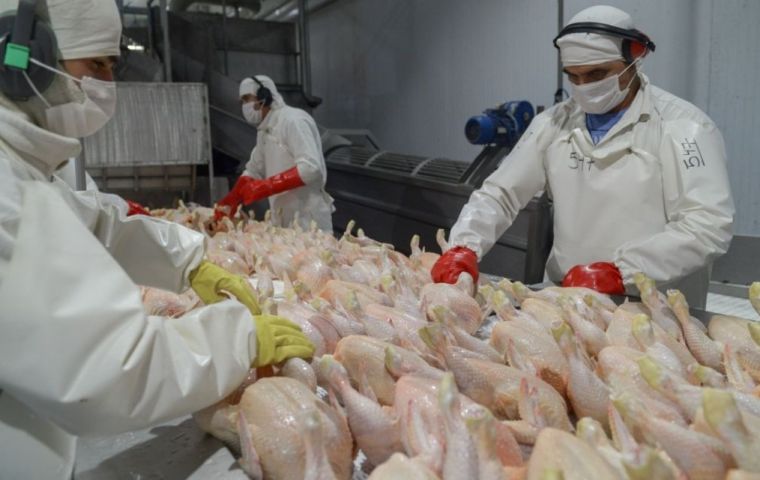MercoPress. South Atlantic News Agency
Brazil maneuvering to resume chicken exports to Europe
 Brazil reportedly stopped exporting about 123,000 tons of chicken due to the avian flu detection
Brazil reportedly stopped exporting about 123,000 tons of chicken due to the avian flu detection Brazil's Agriculture Minister Carlos Fávaro held a videoconference with EU Commissioner for Health and Animal Welfare, Olivér Várhelyi, this week to discuss lifting restrictions on the Brazilian chicken meat exports imposed after an outbreak of Highly Pathogenic Avian Influenza (HPAI) at a commercial farm in Montenegro, Río Grande do Sul, in May.
Fávaro emphasized the effectiveness of Brazil's health system, stating that the country has already met all required measures and regained its disease-free status with the World Organization for Animal Health (OIE). Therefore, he formally requested the EU's recognition of Brazil as avian influenza-free.
“This is not about celebrating the crisis, but rather recognizing the opportunity we had to demonstrate the robustness of our health system. We have complied with all protocols, controlled the outbreak, and, knowing the Brazilian and European health regulations and their equivalence—with the necessary particularities—I formally request the recognition, also by the European Union, of Brazil as a country free of avian influenza. This is the main request of this meeting,” said Fávaro.
Commissioner Várhelyi acknowledged Brazil's transparency and swift action but noted that EU rules are stricter than OIE parameters and require additional information regarding Brazil's surveillance program. “This is a technical and routine procedure, applied uniformly to both third countries and the Member States of the European Union themselves,” explained Várhelyi.
“I am satisfied with the outcome of the meeting and confident that, with the submission of the requested additional information, Brazil will have its sanitary status duly recognized by the European Union, allowing for the full resumption of chicken meat exports,” Fávaro told local media.
The temporary suspension of Brazilian chicken exports due to the avian flu outbreak led to an in the domestic market, causing prices to drop significantly. Brazil reportedly stopped exporting about 123,000 tons of chicken, contributing to this surplus. With chicken being the most consumed animal protein in Brazil (46 kg per capita annually), the lower prices have been a boon for consumers.
However, with the anticipated resumption of exports to the EU and other markets, a normalization of the market and a probable increase in chicken prices are to be expected.




Top Comments
Disclaimer & comment rulesCommenting for this story is now closed.
If you have a Facebook account, become a fan and comment on our Facebook Page!